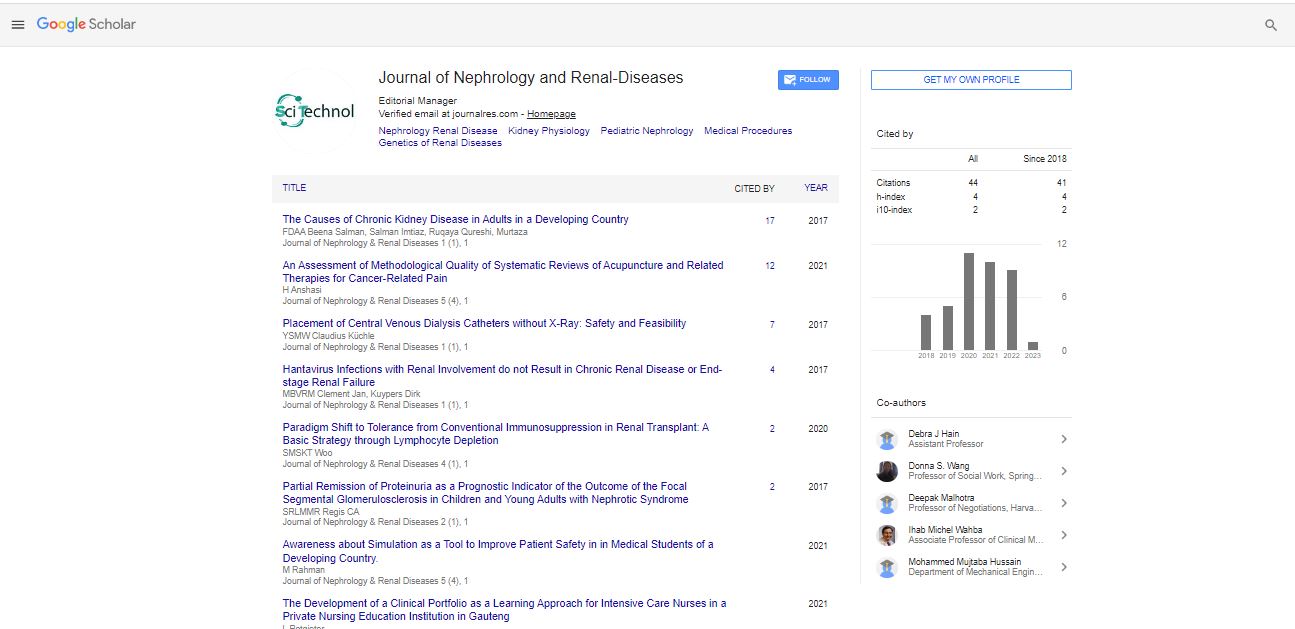Perspective, J Nephrol Ren Dis Vol: 7 Issue: 4
The Silent and Progressive Threat of Hypertensive Nephropathy: Risk Factors and Treatment Options
Shigekazu Fumiuara*
1Department of Nephrology and Rheumatology, Kanazawa University, Ishikawa, Japan
*Corresponding Author: Shigekazu Fumiuara,
Department of Nephrology and
Rheumatology, Kanazawa University, Ishikawa, Japan
E-mail: shigekazu.fumiara03@toranomon.gr.jp
Received date: 01 November, 2023, Manuscript No. JNRD-23-123899;
Editor assigned date: 03 November, 2023, PreQC No. JNRD-23-123899 (PQ);
Reviewed date: 20 November, 2023, QC No. JNRD-23-123899;
Revised date: 27 November, 2023, Manuscript No. JNRD-23-123899 (R);
Published date: 04 December, 2023, DOI: 10.4172/2576-3962.1000047
Citation: Fumiuara S (2023) The Silent and Progressive Threat of Hypertensive Nephropathy: Risk Factors and Treatment Options. J Nephrol Ren Dis 7:4.
Abstract
Hypertensive nephropathy, also known as hypertensive kidney disease, is a condition characterized by kidney damage caused by chronic high blood pressure. Over time, the persistent elevation of blood pressure can lead to structural and functional changes in the kidneys, potentially resulting in kidney failure. Hypertensive nephropathy is a common cause of Chronic Kidney Disease (CKD) and End-Stage Renal Disease (ESRD). The kidneys play a crucial role in regulating blood pressure by controlling fluid balance, electrolytes, and the release of renin, an enzyme involved in blood pressure regulation.
Description
Hypertensive nephropathy, also known as hypertensive kidney disease, is a condition characterized by kidney damage caused by chronic high blood pressure. Over time, the persistent elevation of blood pressure can lead to structural and functional changes in the kidneys, potentially resulting in kidney failure. This article explores the intricacies of hypertensive nephropathy, its risk factors, and effective strategies for prevention and treatment.
Understanding hypertensive nephropathy
Hypertensive nephropathy is a common cause of Chronic Kidney Disease (CKD) and End-Stage Renal Disease (ESRD). The kidneys play a crucial role in regulating blood pressure by controlling fluid balance, electrolytes, and the release of renin, an enzyme involved in blood pressure regulation. When blood pressure remains consistently elevated, the delicate structures within the kidneys are subjected to increased stress, leading to a cascade of pathological changes. Chronic high blood pressure can cause damage to the small blood vessels (arterioles) and nephrons within the kidneys. This damage leads to scarring, thickening of the blood vessel walls, and a reduction in blood flow to the renal tissues. The glomeruli, which are the filtering units of the kidneys, may experience increased pressure. This can result in glomerular damage and proteinuria (excessive protein in the urine), a hallmark of kidney dysfunction. The interstitial spaces between the tubules can undergo fibrosis, impairing the kidney's ability to filter and reabsorb substances properly. This fibrotic process contributes to a decline in kidney function. The persistent elevation of blood pressure can lead to a reduction in blood flow to the kidneys, causing ischemia and further contributing to tissue damage.
Prevention of hypertensive nephropathy
Preventing hypertensive nephropathy involves managing and controlling blood pressure effectively. Several key strategies can aid in the prevention of this condition. Regular monitoring of blood pressure is crucial for early detection and management of hypertension. Individuals should have their blood pressure checked regularly, and those with hypertension should work closely with healthcare professionals to maintain optimal blood pressure levels. Adopting a healthy lifestyle plays a pivotal role in preventing hypertensive nephropathy. This includes maintaining a balanced diet rich in fruits, vegetables, and low-fat proteins, engaging in regular physical activity, and avoiding excessive salt intake. Excessive alcohol consumption can contribute to hypertension. Limiting alcohol intake is advisable for overall cardiovascular health and reducing the risk of hypertensive nephropathy. Smoking is a risk factor for both hypertension and kidney disease. Quitting smoking can significantly improve overall health and reduce the risk of kidney damage. Achieving and maintaining a healthy weight is essential in preventing hypertensive nephropathy. Weight management can positively impact blood pressure and reduce the strain on the kidneys.
Treatment of hypertensive nephropathy
Antihypertensive medications are a cornerstone in the treatment of hypertensive nephropathy.Medications such as Angiotensin-Converting Enzyme (ACE) inhibitors and Angiotensin II Receptor Blockers(ARBs) are often prescribed to help lower blood pressure and provide additional renoprotective benefits. Diuretics, or water pills, may be prescribed to help control fluid balance and reduce blood pressure. Thiazide diuretics are commonly used in the management of hypertension. Lifestyle modifications, including dietary changes, regular exercise, and stress management, are integral to the treatment plan. These measures can contribute to overall cardiovascular health and aid in blood pressure control. In cases of significant proteinuria, restricting dietary protein may be recommended to alleviate the strain on the kidneys. However, individualized dietary recommendations should be made in consultation with healthcare professionals. Identifying and managing underlying conditions contributing to hypertension, such as diabetes, is essential. Comprehensive care involves addressing all aspects of the patient's health that may impact blood pressure and kidney function. Regular monitoring of kidney function, blood pressure, and other relevant parameters is crucial in assessing the effectiveness of treatment and making adjustments as needed.
Conclusion
Diuretics, encompassing thiazide, loop, and potassium-sparing varieties, constitute a vital class of medications in the management of various medical conditions. Their mechanisms of action involve modifying sodium and water reabsorption in the kidneys, thereby influencing fluid balance throughout the body. Diuretics play a central role in treating hypertension, edema, heart failure, and certain kidney disorders, contributing significantly to improved patient outcomes. Despite their efficacy, it is imperative to monitor for potential side effects, particularly electrolyte imbalances and dehydration. Regular follow-up with healthcare providers ensures appropriate adjustments to dosage and intervention if adverse effects occur. In conclusion, the judicious use of diuretics, guided by a thorough understanding of their mechanisms and potential side effects, remains essential in optimizing patient care and addressing fluid-related disorders.
 Spanish
Spanish  Chinese
Chinese  Russian
Russian  German
German  French
French  Japanese
Japanese  Portuguese
Portuguese  Hindi
Hindi 
